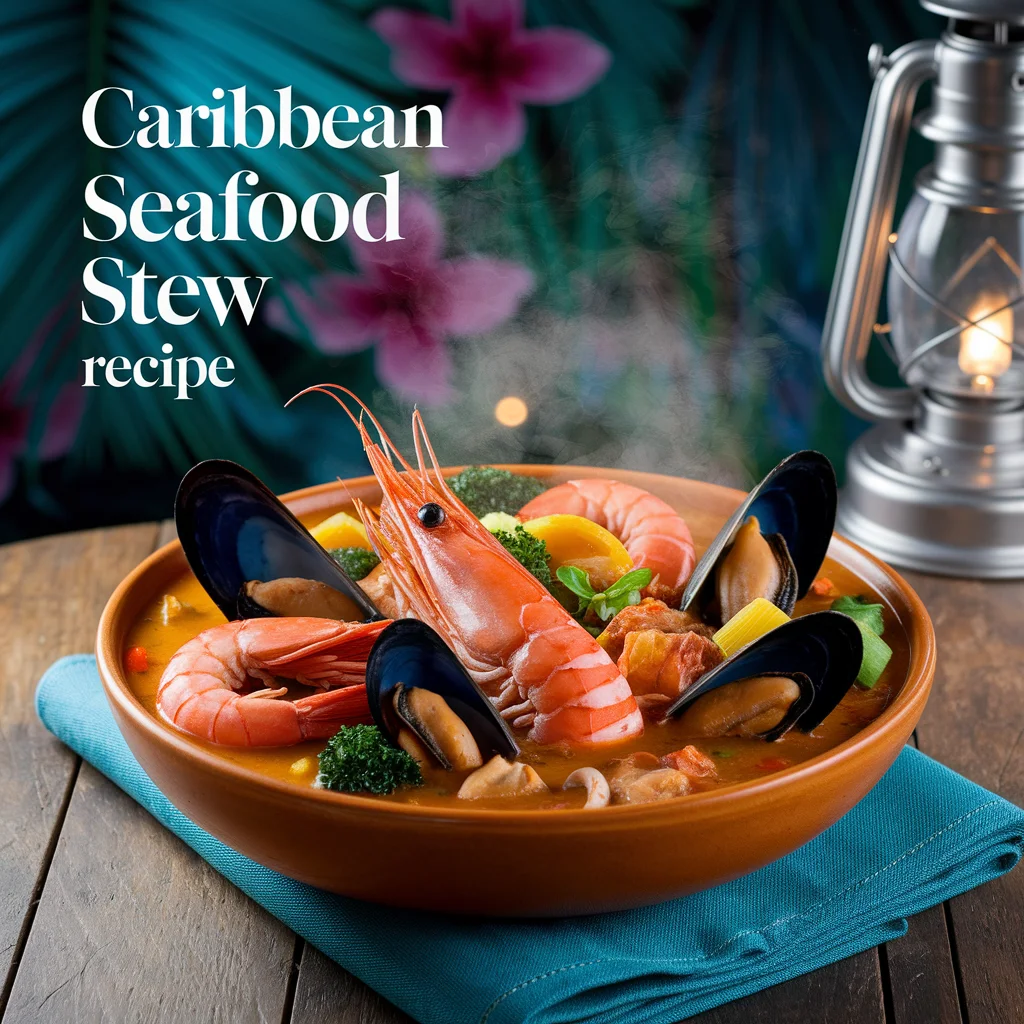Making a Caribbean seafood stew recipe is a fantastic way to enjoy fresh flavors all in one pot. This recipe combines tender shrimp, flaky fish filet, juicy tomatoes, and crunchy bell pepper to create a bright and vibrant taste that instantly transports you to sunny beaches and warm ocean breezes. It’s simple yet packed with flavor, especially with the addition of aromatic fresh herbs.
When preparing this stew, start by sautéing bell pepper with onions and garlic, filling your kitchen with a rich aroma. Then, add tomatoes and let everything simmer to blend the flavors perfectly. Adding shrimp and fish filet near the end keeps the seafood tender and juicy without overcooking it, while fresh herbs on top add a refreshing burst of green.
This one-pot meal is perfect for a quick dinner but special enough to serve guests. The best part? It’s incredibly easy to clean up afterward! Every bite offers a little taste of the Caribbean – a rich, colorful, and comforting meal that’s so YUM.
From experience, using quality, fresh ingredients makes all the difference. The combination of fish filet, shrimp, and veggies in a simple recipe like this brings a little tropical sunshine to your table any day of the week.
Ingredients You’ll Need
The foundation of a great Caribbean seafood stew recipe lies in its ingredients. Using fresh, high-quality seafood and produce is essential for achieving the authentic, bright flavors this dish is known for. Here’s a detailed list of what you’ll need:
| Ingredient | Purpose/Notes |
| Shrimp (peeled and deveined) | Provides tender, juicy seafood protein |
| Fish filet (e.g., snapper, cod, or grouper) | Flaky texture and mild flavor for balance |
| Bell peppers (red, yellow, or green) | Adds crunch and sweetness |
| Ripe tomatoes (fresh or canned) | Base for rich, tangy stew broth |
| Onions (yellow or white) | Builds savory depth and aroma |
| Garlic cloves | Adds pungent, aromatic flavor |
| Fresh herbs (cilantro, thyme, parsley) | Brightness and herbal freshness |
| Scotch bonnet pepper (optional) | Adds authentic Caribbean heat; use cautiously |
| Coconut milk (optional) | Creamy texture and subtle sweetness |
| Vegetable or fish stock | Enhances broth depth without overpowering |
| Olive oil or coconut oil | For sautéing and flavor |
| Salt and black pepper | Essential seasoning |
| Lime or lemon juice | For brightening and balancing flavors |
Why Fresh Ingredients Matter
Using fresh seafood is key – frozen or low-quality fish and shrimp can become tough or bland after cooking. Fresh vegetables like ripe tomatoes and crunchy bell peppers ensure the stew tastes lively and not dull. Herbs like cilantro and thyme lift the entire dish with their aromatic qualities.
Step-by-Step Cooking Instructions
Cooking the perfect Caribbean seafood stew is all about layering flavors and timing the seafood so it stays tender and juicy. Here’s a clear, detailed guide:
1. Prepare Your Ingredients
- Peel and devein the shrimp; cut the fish filet into bite-sized chunks.
- Dice bell peppers, onions, and tomatoes; mince garlic and chop herbs.
2. Sauté Aromatics
- Heat olive oil or coconut oil in a large pot over medium heat.
- Add onions, bell peppers, and garlic; sauté until fragrant and softened (about 5 minutes).
- Optional: Add scotch bonnet pepper for heat – be careful, it’s spicy!
3. Build the Base
- Add diced tomatoes and cook down until they break down and release their juices (about 10 minutes).
- Pour in the stock and stir to combine. Let simmer for 10–15 minutes for flavors to meld.
4. Add Seafood
- Gently add fish pieces first, and simmer for 3–5 minutes.
- Add shrimp last; cook until shrimp turn pink and opaque (2–3 minutes). Avoid overcooking.
5. Finish with Fresh Herbs and Lime
- Remove from heat and stir in chopped herbs and a squeeze of lime or lemon juice for brightness.
- Season with salt and pepper to taste.
Pro Tips for Tender Seafood
- Add shrimp and fish at the end of cooking to avoid toughness.
- Use medium heat simmering, not boiling, to gently cook seafood.
- Avoid stirring vigorously once seafood is added to keep fish pieces intact.
Tips for Perfect Seafood Stew
Making a flavorful, tender Caribbean seafood stew is easy once you know the tricks. Here are some expert tips that elevate your dish every time:
- Choose firm, white fish like snapper or cod, which hold up well during simmering.
- Use a mix of seafood – the combination of shrimp and fish offers texture variety.
- Season layers: season vegetables as they cook, then adjust at the end.
- Consider adding coconut milk for a creamy texture that balances acidity.
- Use fresh herbs generously at the end to add freshness and color.
- For authentic Caribbean heat, include scotch bonnet or habanero peppers, but balance with lime juice and coconut milk.
- Let the stew rest for a few minutes before serving to let flavors deepen.
- Serve with rice or crusty bread to soak up the delicious broth.
Recipe Variations
The beauty of Caribbean seafood stew is its versatility. You can customize it to your tastes or dietary needs:
| Variation | Description |
| Spicy Stew | Add more scotch bonnet peppers or hot sauce |
| Creamy Coconut Stew | Stir in coconut milk after simmering |
| Mixed Seafood | Include mussels, clams, or crab for variety |
| Vegetarian Version | Substitute seafood with hearty vegetables and beans |
| Gluten-Free | Use gluten-free stock or homemade broth |
| Low-Sodium | Use low-sodium stock and limit added salt |
Real-World Example: Jamaican Seafood Stew
In Jamaica, seafood stew is often made with fresh catch of the day and features a spicy kick from scotch bonnet peppers. A family-run restaurant in Montego Bay shared how their stew recipe has been passed down through generations, emphasizing the use of fresh herbs and slow simmering to develop deep flavors without overcooking the seafood. This traditional approach highlights respect for ingredients and patience in cooking.
Serving Suggestions & Storage
Serving Ideas
- Serve your stew over steamed white rice or coconut rice for a traditional touch.
- Pair with fried plantains or cassava bread for an authentic Caribbean meal.
- Garnish with extra cilantro or parsley and lime wedges for freshness.
- A side salad with tropical fruits like mango or pineapple balances the meal’s richness.
Storage Tips
- Store leftovers in an airtight container in the refrigerator for up to 2 days.
- Seafood can lose texture when reheated- warm gently on the stovetop or microwave at low power.
- Freeze only if necessary; thaw slowly in the fridge to maintain quality.
More Easy One-Pot Stew & Soup Recipes
If you loved this Caribbean seafood stew, try these simple, one-pot meals that bring bold flavors and convenience:
| Recipe Name | Main Ingredients | Flavor Profile |
| Spicy Cajun Seafood Gumbo | Shrimp, sausage, okra, tomatoes | Smoky, spicy, hearty |
| Thai Coconut Curry Soup | Coconut milk, lemongrass, shrimp | Creamy, fragrant, spicy |
| Mediterranean Fish Stew | Tomatoes, olives, white fish | Tangy, herbal, savory |
Summary
The Caribbean seafood stew is a delicious, nutritious, and colorful dish that’s perfect for any occasion. With just a handful of fresh ingredients and a simple cooking method, you can bring the tropical flavors of the Caribbean coast into your kitchen. Remember to use quality seafood, cook it gently, and finish with fresh herbs and citrus to brighten the dish.
Whether you want a quick weeknight meal or a dish to impress friends and family, this stew is an excellent choice. Explore the recipe variations to make it your own, and don’t forget to pair it with rice or bread to soak up every drop of the savory broth.
Final Thoughts
The Caribbean seafood stew recipe is truly a celebration of fresh, vibrant, and bold flavors that bring a tropical breeze to your dinner table. Its beauty lies in the simplicity of combining quality seafood, fresh vegetables, and aromatic herbs in one pot, creating a dish that is both nutritious and incredibly satisfying. This stew is perfect for those who want a meal that’s easy to prepare yet full of rich, layered flavors.
One of the biggest advantages of this recipe is its versatility. You can easily customize it by swapping seafood types, adjusting the spice level, or adding creamy coconut milk for a different texture. Whether you prefer a fiery kick from scotch bonnet peppers or a milder, herbaceous stew, this recipe adapts to your preferences.
Cooking this Caribbean seafood stew recipe also teaches the importance of timing and technique. Adding shrimp and fish at the end ensures the seafood stays tender and juicy, while slow simmering allows the vegetables and broth to develop depth. Using fresh herbs and a squeeze of citrus at the end brightens the stew, balancing the richness perfectly.
This dish not only satisfies the palate but also nourishes the body with protein-rich seafood and vitamin-packed vegetables. It’s an excellent choice for a healthy, wholesome meal that doesn’t compromise on taste.
Lastly, the Caribbean seafood stew recipe is more than just food- it’s a way to connect with Caribbean culture and the joyful spirit of coastal living. Bringing this stew into your kitchen invites the warmth of sunny beaches and ocean breezes, making every meal feel special.
FAQs
What type of fish is best for Caribbean seafood stew?
Firm white fish like snapper, cod, or grouper work best as they hold up well during simmering without falling apart. Fresh fish is preferred for optimal flavor and texture.
Can I make this stew spicy?
Yes! Add scotch bonnet peppers or a dash of hot sauce to bring authentic Caribbean heat. Start small and adjust to your taste to avoid overwhelming spice.
Is this stew suitable for freezing?
Seafood stews generally don’t freeze well, as reheating can make seafood tough. It’s best to store leftovers in the fridge and consume them within 2 days for the best texture.
Can I substitute coconut milk in the recipe?
Absolutely. Coconut milk adds creaminess and a subtle sweetness that balances spicy flavors. If you prefer a lighter stew, you can omit it without sacrificing taste.
What should I serve with Caribbean seafood stew?
Traditionally, serve with steamed white or coconut rice to soak up the flavorful broth. Fried plantains or crusty bread also complement the dish beautifully.




